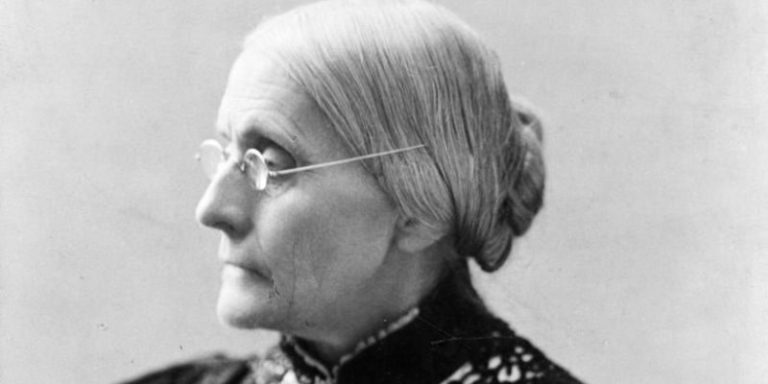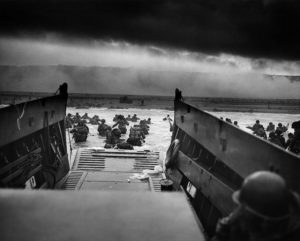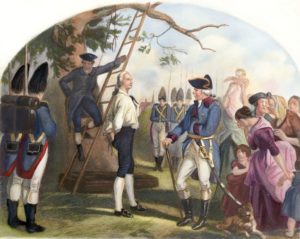This Week in History: June 5 – 11
Susan B. Anthony gets fined for voting and D-Day marks the beginning of the Battle of Normandy.
By: Kelli Ballard | June 5, 2022 | 902 Words

Susan B. Anthony (Photo by: Photo12/Universal Images Group via Getty Images)
“Anyone who believes you can’t change history has never tried to write his memoirs.” ~ David Ben Gurion
June 6, 1872: Susan B. Anthony Gets Fined for Voting
Susan B. Anthony was an equal-rights activist who fought tirelessly for women to get the right to vote. At the time, the First Amendment protected the right to assemble in public, but it was not really allowed for women to address political issues. She once said, “Trust me that as I ignore all law to help the slave, so will I ignore it all to protect an enslaved woman.”
On June 6, 1872, in New York, Anthony was fined for voting in a presidential election. She later tried to vote again, after the 15th Amendment gave voting rights to black men but not women, and was arrested and fined for that attempt. In August 1920, women were given the right to vote with the 19th Amendment, also known as the Susan B. Anthony Amendment, about 50 years after her death.
June 6, 1944: D-Day

(Photo by: Universal History Archive/Universal Images Group via Getty Images)
The Battle of Normandy during World War II (1939-1945) lasted from June 1944 to August 1944. Germany had already invaded and occupied France by May 1940, and the US joined the war in 1941.
General Dwight Eisenhower, in January 1944, became the commander of Operation Overload. The mission was to trick the Germans into thinking there was going to be an invasion in Pas-de-Calais and other false locations, instead of in Normandy.
At dawn, on June 6, 1944, around 156,000 American, British, and Canadian troops landed on five beaches in Normandy, France. This was known as D-Day and was the largest amphibious landing in history. By the end of the day, the allies were successful at storming Normandy’s beaches and reclaiming the area.
Other Notable Mentions
June 5, 1783: Brothers Joseph and Jacques Montgolfier launched the first hot-air balloon in Annonay, France.
June 5, 1968: Robert F. Kennedy was assassinated while leaving a hotel in Los Angeles, California. The shooting happened just after he was celebrating his victory in the California presidential primary. His brother was President John F. Kennedy.
June 6, 1978: California voters approved Proposition 13. This amendment limited property tax rates.
 June 8, 1874: Cochise, an Apache leader, died on the Chiricahua Reservation in Arizona. He was the chief in principle of the tribe and led war parties against American settlers and the military.
June 8, 1874: Cochise, an Apache leader, died on the Chiricahua Reservation in Arizona. He was the chief in principle of the tribe and led war parties against American settlers and the military.
June 9, 1898: The British signed a 99-year lease for Hong Kong, which lasted until July 1, 1997 when it was then returned to the People’s Republic of China.
June 10, 1652: Silversmith John Hull opened the first mint in Massachusetts, despite English colonial law. The Pine Tree Shilling was the first coin issued that was designed by him.
June 11, 1991: Mount Pinatubo in the Philippines erupted.
Famous Birthdays
Adam Smith (June 5, 1723) was born in Kirkcaldy, Scotland. A Scottish economist and philosopher, he wrote An Enquiry into the Nature and Causes of the Wealth of Nations which was published in 1776. He was one of the most influential people regarding the development of the modern economic theory.

Nathan Hale (Getty Images)
John Maynard Keynes (June 5, 1883) was born in Cambridge, England. An economist, he wrote The General Theory of Employment, Interest and Money, which was published in 1936. He claimed that consumers were not the source of business cycles, but that it was the government’s responsibility.
Nathan Hale (June 6, 1755) was born in Coventry, Connecticut. During the American Revolution, he was a patriot and spy who said, “I only regret that I have but one life to lose for my country” just before he was hanged.
Paul Gauguin (June 7, 1848) was born in Paris. He was a painter with such works as Vision After the Sermon and When Shall We Be Married? His style inspired other artists, including Pablo Picasso.
Frank Lloyd Wright (June 8, 1867) was born in Richland Center, Wisconsin. An architect, he is known for the Prairie School style of building houses with low-pitched roofs that blended into the landscape. He wrote, “No house should ever be on any hill or on anything. It should be of the hill, belonging to it, so hill and house could live together each the happier for it.”
Cole Porter (June 9, 1893) was born in Peru, Indiana. He was a composer and lyricist and published his first song at the age of ten called The Bobolink Waltz. His other Broadway works include Anything Goes and Kiss Me Kate.
Hattie McDaniel (June 10, 1889) was born in Wichita, Kansas. She was a black actress who won an Academy Award in 1940 for portraying the character Mammy in Gone with the Wind.
Judy Garland (June 10, 1922) was born in Grand Rapids, Minnesota as Frances Gumm. The actress is best known for playing Dorothy Gale in The Wizard of Oz (1939).
Georg Richard Strauss (June 11, 1864) was born in Munich. A German composer, he is known for several works including Don Quixote (1898).
Jeannette Rankin (June 11, 1880) was a feminist politician and the first woman elected to the US Congress.
Jacques Cousteau (June 11,1910) was born in Ste-Andre-de-Cubzac, France. He was an undersea explorer and helped to invent the first breathing apparatus for diving. His television series, The Undersea World of Jacques Cousteau was an Emmy Award winner.
Vince Lombardi (June 11, 1913) was born in Brooklyn, New York. He coached the Green Bay Packers football team to win five NFL titles and two Super Bowls.
















